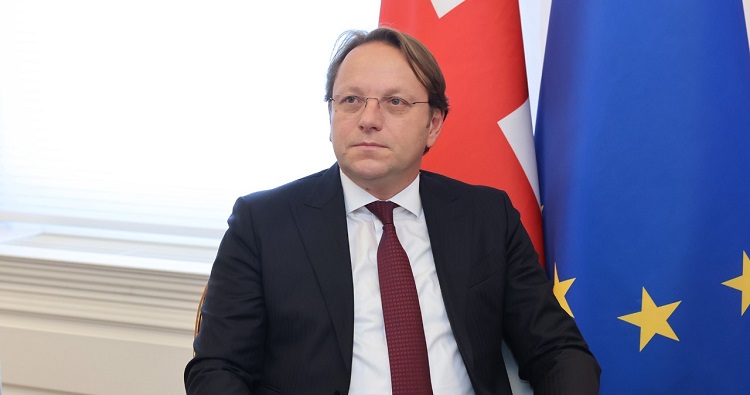Georgia “fulfilled” 3 of EU priorities, “achieved some progress” in others - EU Commissioner

Following the informal meeting of EU member states’ foreign ministers in Stockholm, Várhelyi pointed out the EU recommendations achieved “on gender equality and fighting against violence against women”, “taking into account European Court of Human Rights judgments in court deliberation” and “appointing a public defender [in the country] through a transparent process”. Photo via Government Administration
Olivér Várhelyi, the European Commissioner for Neighbourhood and Enlargement, on Thursday said Georgia had fulfilled three out of the 12 priorities outlined by the European Union for granting the country its membership candidate status, in his oral interim report on Georgia, Ukraine and Moldova on the implementation of the EU reforms.
Following the informal meeting of EU member states’ foreign ministers in Stockholm, Várhelyi pointed out the EU recommendations achieved “on gender equality and fighting against violence against women”, “taking into account European Court of Human Rights judgments in court deliberation” and “appointing a public defender [in the country] through a transparent process”.
He emphasised the country had achieved “some progress” in seven remaining areas and “briefly” reviewed those recommendations, including the political polarisation, on which the EU Commissioner said the Government needed to “ensure an efficient oversight of the Parliament and end the use of harsh rhetoric and honour passed political agreements”, citing the EU-mediated 19th of April agreement.
Regarding the obligation to guarantee the full functioning of the state institutions and further improve the electoral framework, Várhelyi praised the adoption of a public administration reform strategy and an action plan, as well as amending the electoral code and the law on political associations with the recommendations of the Venice Commission of the Council of Europe.
We still need Georgia to improve the parliamentary oversight to adequately investigate allegations of electoral malpractices as highlighted in the ODIHR reports and to reverse the electoral amendments changing the appointment procedure of the CEC Chairman, this is the Central Election Commission”, he added.
The Commissioner said to fulfil the recommendation on the inclusive and effective judicial reform, Georgia needed to submit amendments on judicial reform to the Venice Commission for a second opinion, adopt the broader reform of the judiciary and appoint the remaining non-judge members of the High Council of Justice.
The newly formed Anti-Corruption Bureau was also highlighted by the EU official, noting the country “still needs to ensure that the Bureau operates independently and that the Venice Commission is consulted on the draft legislation”.
Várhelyi hailed the Georgian authorities' efforts to strengthen the fight against organised crime, noting “Georgia stepped up its cooperation with Europol and the member states”. He also added that to enhance the protection of human rights and vulnerable groups, the country should prepare an action plan for human rights strategy in an “inclusive manner” and ensure freedom of assembly and protection for members of the LGBT QI community.
“Involving the civil society and decision making processes at all levels, Georgia needs to resume constructive dialogue with the civil society and implement regular and transparent consultations”, the EU Commissioner emphasised and noted Georgia had achieved “limited progress” on the deoligarchisation, welcoming the yesterday’s decision of the ruling Georgian Dream party not to approve the domestic bill on deoligarchisation until December.
Now Georgia has to focus on and adopt a law, setting out a systemic approach in line with the Venice Commission recommendations, including by reinforcing rules on competition policy and financing of political parties”, he noted in his report.
The EU Commissioner said Georgia also needed to amend a law on broadcasting in line with the legal opinion of the Council of Europe and to ensure the safety of journalists and to raise the level of protection of freedom of journalists and media owners.
 Tweet
Tweet  Share
Share